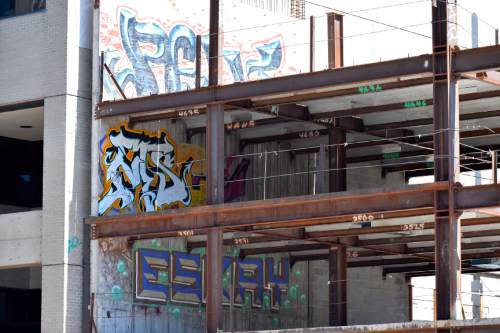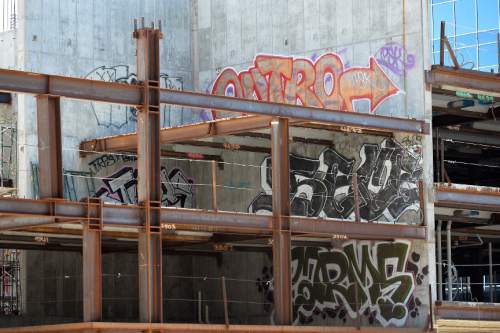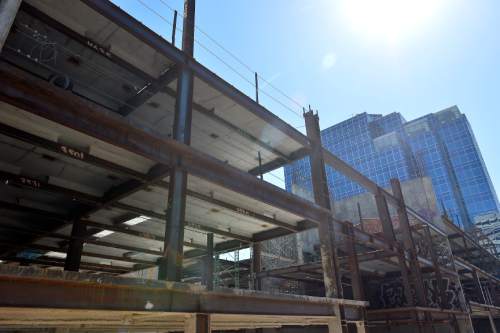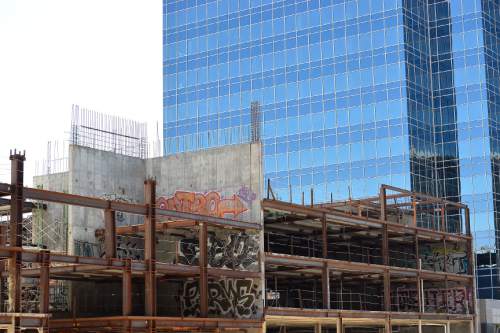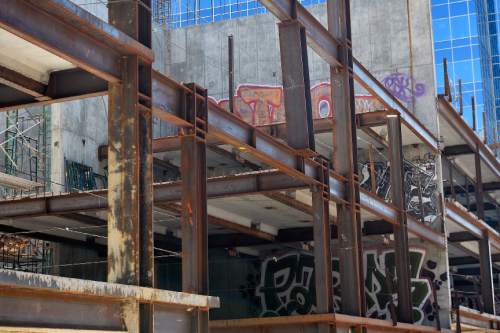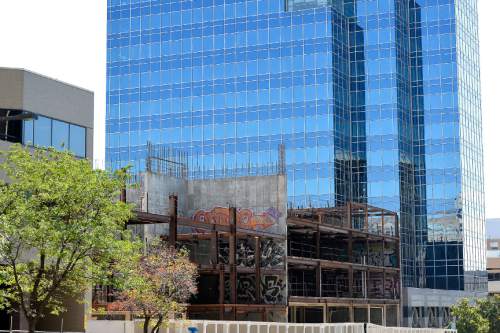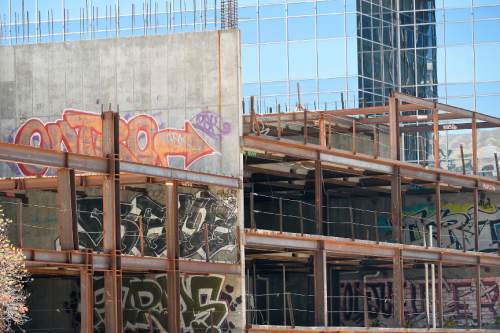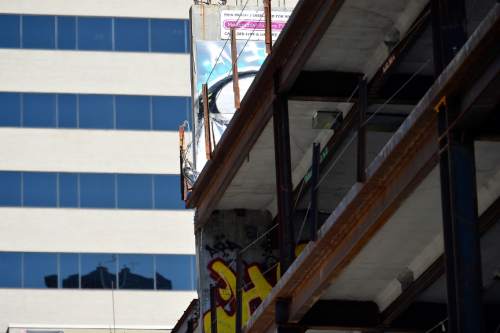This is an archived article that was published on sltrib.com in 2016, and information in the article may be outdated. It is provided only for personal research purposes and may not be reprinted.
One of Salt Lake City's major hopes for new affordable housing downtown is instead a pile of empty steel boxes covered in rust and graffiti.
Construction on the high-profile Plaza at State Street project bogged down more than a year ago, mired in engineering woes, lawsuits and a developer's growing debts.
Now, officials fear, the vexed redevelopment project at 255 S. State St. may get worse.
Utah-based architect and developer Ben Logue and his company Tannach Properties — with visions of new shops and residential towers rising around a European-style plaza — remain in default on at least $19.5 million in loans for the troubled undertaking, according to city documents.
Despite pleas from Mayor Jackie Biskupski, City Council members and key housing officials, lenders at Citibank are close to foreclosing on 1.1 acres beneath the site, property the city sold to Logue in 2012.
"We look forward to engaging in a positive discussion with Citibank regarding opportunities to identify a solution," Biskupski wrote in an Aug. 2 letter seeking talks on the project.
Mayoral spokesman Matthew Rojas said her query got no response.
A Citibank spokeswoman confirmed Tuesday the property is subject to foreclosure but said the bank continued to have "an active dialogue with the city."
"Despite having incurred substantial losses in our role as commercial lender, Citi has worked in good faith with all parties involved," said Danielle Romero-Apsilos, the bank's New York-based managing director of public affairs.
The city's Redevelopment Agency is now bracing for foreclosure — and the prospect of losing all legal rights to the downtown property and any influence on its future design.
Council member and RDA Board chairwoman Lisa Adams, who co-signed the mayor's letter with Councilman James Rogers, called the 4-year-old venture "disappointing" and "a huge frustration," especially for its lost promise of scores of affordable homes.
"It's such an eyesore, such a problem," Adams said this week, "and we so desperately need what we were hoping for there."
Multiple attempts to reach Logue were unsuccessful. An answering machine at the offices of LaPorte Construction, one of his companies, said, "We are no longer in business."
In addition to stores, restaurants and a plaza extending east to a newly overhauled portion of Edison Street, Plaza at State was meant to add 180 apartments to the city's housing inventory, including 136 for low- and moderate-income households.
Those units were supposed to replace about 50 single-occupancy rooms of low-income housing lost when crews demolished the old Regis and Cambridge hotels for the project.
As many as 18 state, municipal and housing agencies in Utah, along with private investors, chipped in for Plaza at State.
With an inaugural celebration that drew Utah luminaries, Tannach Properties broke ground in May 2012 — with full RDA backing. But Logue's work on the upscale $32.5 million mixed-used development hit early obstacles.
City officials raised red flags on subpar accounting and management as the project's price tag soared above $55 million.
City documents say an engineering study commissioned by Tannach later found deficiencies in a steel structure supporting the construction — problems the company later told the RDA were not economically feasible to fix.
Brazilian reinforcing-steel producer Gerdau Ameristeel sued Tannach and LaPorte Construction, court filings show, for allegedly failing to pay $269,747 for materials and labor it says it delivered to the Plaza at State site. Gerdau won a settlement in April.
It remains unclear just how much of the steel structure would need to be razed and replaced if a new developer takes over.
Citibank, the project's primary lender, declared Tannach in default in June 2015, RDA documents say. A month later, the RDA told Logue he was also in default on the city's development accord after work ground to a halt.
The work site has since become a target for graffiti and a growing safety risk, according to RDA memos — a view neighbors confirm.
"The area is now attracting drug addicts and the homeless," said an adjacent business owner. "It's an absolute mess."
Meeting behind closed doors in April, the Salt Lake City Council, as the RDA Board, chose Utah-based developer Cowboy Partners to replace Tannach, with the main goal of salvaging the mixed-income housing. Cowboy Partners CEO Dan Lofgren confirmed this week that Citibank has rejected two offers to acquire the property and foreclosure may be imminent.
Lofgren, nonetheless, praised all parties, including Logue and Citibank, for their goodwill. Given the complex funding of the initial deal, he said, the lender may have few options. "Many if not everyone we've talked to thus far," Lofgren said, "has hopes and a willingness to forebear while we try to figure out how to put this back together as an affordable-housing deal."
In her letter to Citibank, Biskupski highlighted the importance of Plaza at State as stagnant wages and rising rents force many residents to "struggle to pay for housing and other basic needs."
"To our community," the mayor wrote, "the site in its current state represents a failed opportunity to provide affordable housing."
Twitter: @TonySemerad


